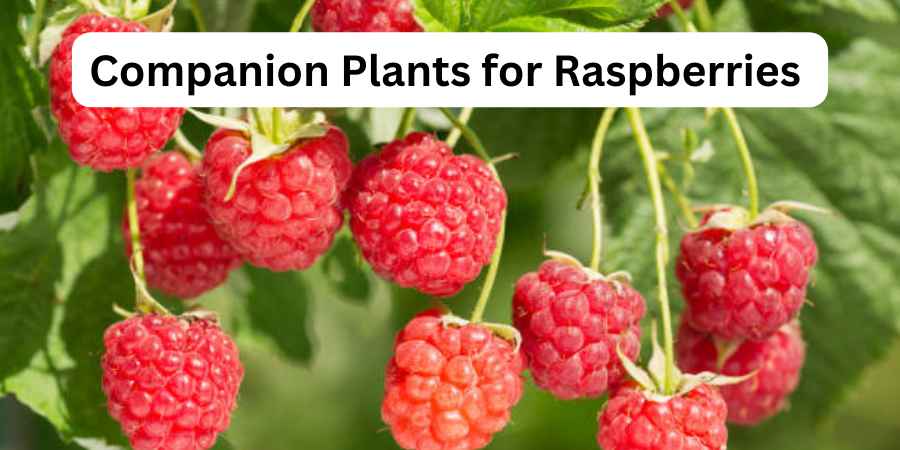Last Updated on June 1, 2025 by Jocelyn
Raspberries grow best with the right companions. Garlic, chives, and onions help keep pests away.
Marigolds and yarrow bring in helpful insects. Legumes like peas add nitrogen to the soil, giving your raspberries a healthy boost.
Good companion plants create a helpful garden community. They protect raspberry canes during tough times and support the growth of underground runners.
Avoid planting raspberries near tomatoes or potatoes since these can spread fungal diseases and harm your crop.
Use this guide to choose the best neighbors for your raspberry rows. A well-planned space leads to better harvests and a healthier garden.
Table of Contents
ToggleBenefits of Raspberries Companion Planting
Growing raspberries can be even more rewarding when you use companion plants. These special plants help your raspberries grow healthy and strong. Companion planting provides many benefits for your garden.
Here’s how:
- Repel pests: Marigold flowers, nasturtiums, and rue deter pests.
- Attract pollinators: Borage attracts bees and ladybugs for better pollination.
- Improve soil nutrients: Bush beans and pole beans enrich the soil with nitrogen.
- Enhance growth and taste: Chamomile enhances nearby plant growth and taste.
- Provide ground cover: Oregano keeps soil cooler by providing cover.
- Provide shade: Tall plants like zucchini and asparagus shade sun-sensitive plants.
- Serve as markers: Fast-growing radishes help mark rows for slow-growing plants.
- Act as mulch and groundcover: Plant parts can be used as mulch and groundcover to protect soil and enhance appearance.
Curious to learn about companion planting? Check out my other guides:
- Companion planting with kohlrabi
- Companion planting for arugula
- Banana companion plants
- Sage companion plants
Best Companion Plants for Raspberries
Companion planting plays a crucial role in achieving this goal. Raspberries prefer full sunlight and well-drained, sandy loam soils that are rich in organic matter, so it is important to select companion plants that have the same requirements.
Since raspberries are usually trellised, there is plenty of room at the bottom of the canes for companion plants. Here are some of the best companion plants :
1. Marigolds
Marigolds are amazing plants for your garden. They help keep away pests like Japanese beetles and harmful nematodes.
The roots and flowers of marigolds release special substances that deter these pests from your raspberry plants.
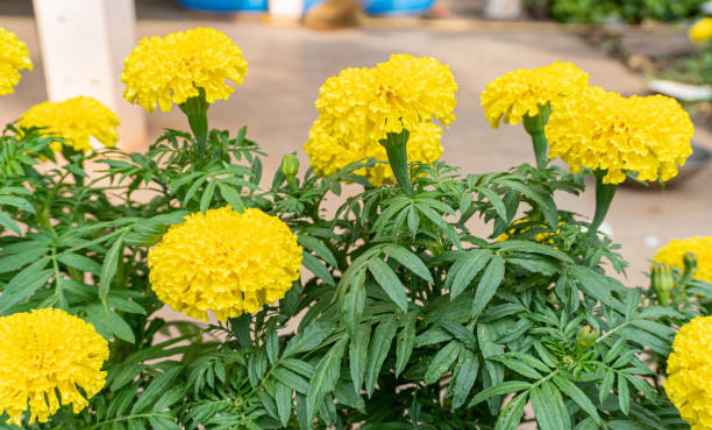
This means your raspberry patch will be safer, and the pollinators that come for the flowers will help with fruit production.
Plus, marigolds and raspberries grow in the same condition, so using the same fertilizer is perfect for both.
I’ve noticed that these colorful flowers not only keep the insects away but also attract useful predators that protect my raspberries.
2. Lavender
Lavender is a great plant to grow with raspberries. It has a lovely fragrance that makes your garden smell nice. Bees and butterflies love lavender, helping with pollination.
This means more pollinators in your garden, which can increase the yield of your raspberries.
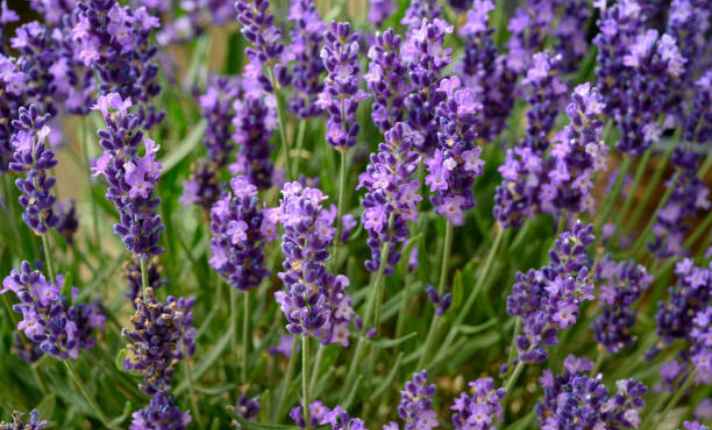
3. Nasturtiums
Growing nasturtiums next to your raspberries is a great idea. These plants have bright, trumpet-shaped flowers that complement the vibrant colors of raspberries.
Nasturtiums attract pollinators and repel annoying pests like aphids, whiteflies, squash bugs, and beetles.
They also act as a trap crop, luring pests away from your raspberries. This keeps your raspberry plants healthy and pest-free.
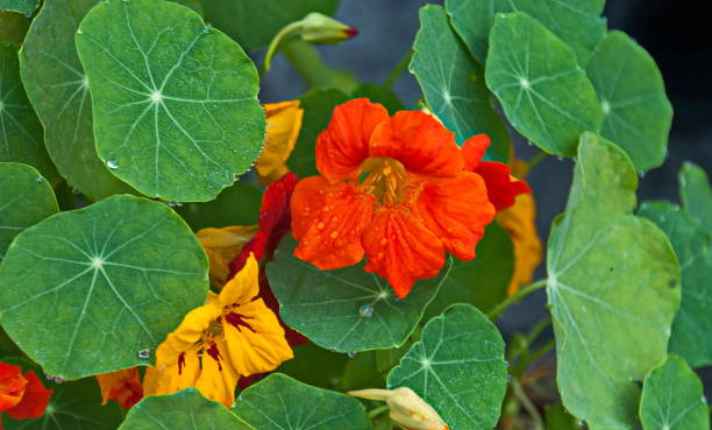
4. Yarrow
Growing a yarrow with raspberry plants is a smart idea. Yarrow is not just a pretty plant; it repels harlequin beetles and other pests that can destroy raspberries.
This amazing plant acts as a magnet for beneficial insects like ladybugs and parasitic wasps, which help control pest populations.
The presence of yarrow plants also attracts useful pollinators, creating lovely aesthetic vibes around your garden.
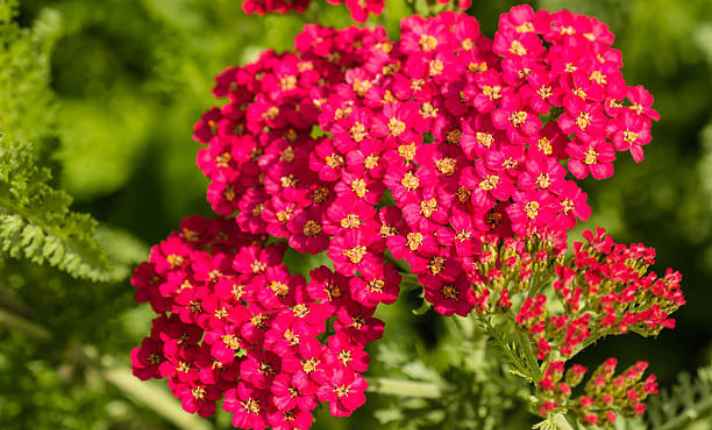
5. Chamomile
Chamomile is a great companion for raspberries. It attracts pollinators like bees with its mesmerizing fragrance.
Planting chamomile near raspberries not only boosts aestheticism in your garden but also deters deer and rabbits from eating your fruit plants. With its low height, chamomile won’t overshadow your raspberries.
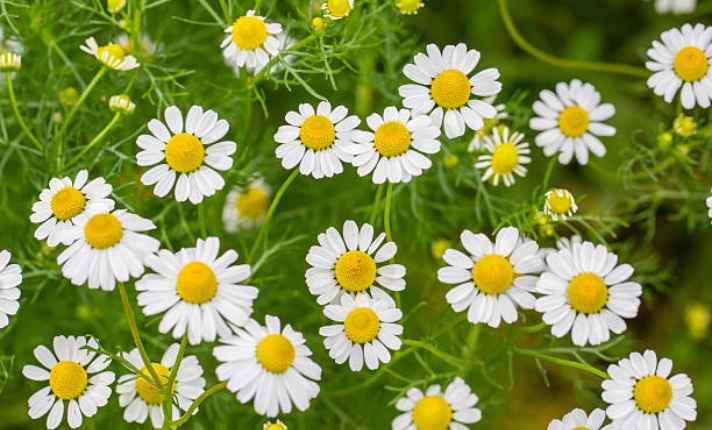
6. Mint
Mint is a great companion plant for raspberries. It helps repel aphids, Japanese beetles, and other pests that are the real culprits of raspberry damage.
The peppermint aroma from mint plants keeps these pests away. Raspberries also improve the growth and flavor of mint.
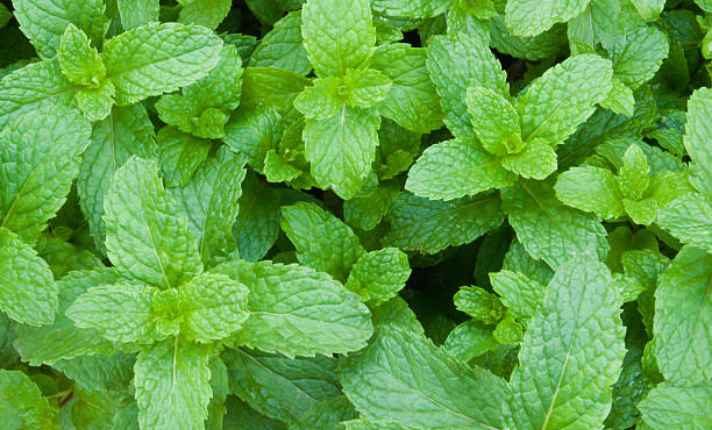
7. Turnips
In my garden, I use turnips as a trap crop to protect my raspberry plants from the harlequin beetle. This pesky bug, part of the stink bug family, usually targets brassicas like broccoli, kohlrabi, and cauliflower, but it also likes raspberries.
Planting turnips helps keep the beetles away. Plus, turnips and raspberries grow in the same soil conditions and temperatures, and aphids avoid raspberries when turnips are nearby.
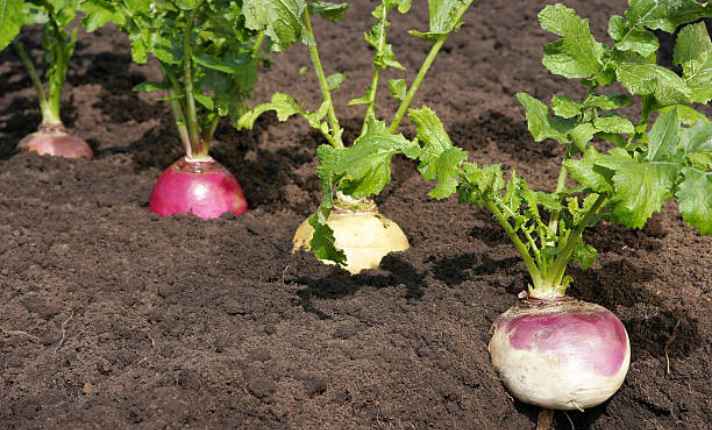
8. Garlic + Chives
Garlic and chives are great companion plants for raspberries. Their strong aroma and odor act as a natural repellent to pests and harmful insects, making the area less appealing to them.
The scent from these plants repels Japanese beetles and deer which could harm the fruit and leaves of the raspberry plants.
These members of the Allium family also help reduce fungal diseases like verticillium wilt, which raspberries are often susceptible to.
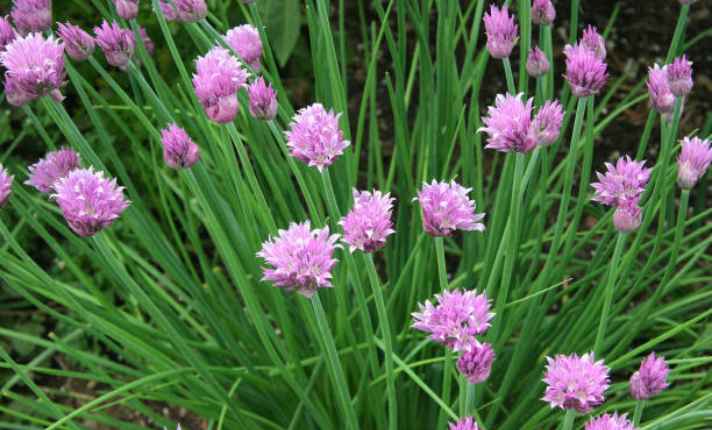
9. Borage
Borage repels pests and attracts pollinators with its beautiful star-shaped flowers. Borage also adds trace minerals to the soil, improving fruit quality and plant growth.
When you have borage in your raspberry patch, its presence can enhance the overall health and productivity of the raspberries. This helps in getting better fruit quality and a healthier raspberry patch.
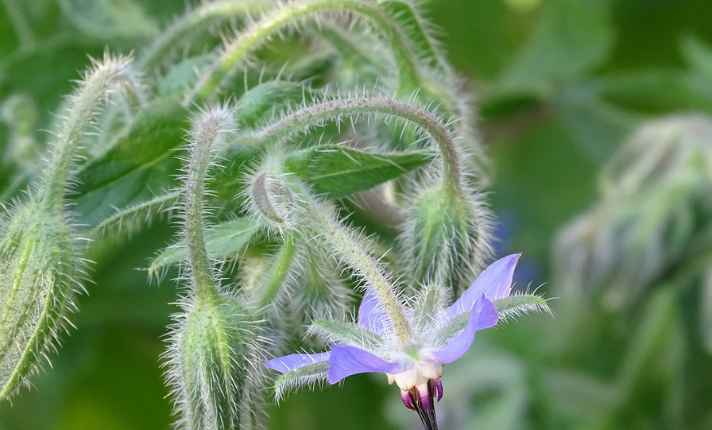
10. Oats
When growing raspberries, oats are great companion plants. They help improve the quality and fertility of the soil by absorbing extra water and nutrients.
This not only makes the soil better but also helps in reducing soil erosion and smothering weed growth.
Spring oats are especially good because they can be planted as a cover crop after the raspberry harvest is complete. In winter, oats help in hardening the raspberry plants, protecting them from trouble.
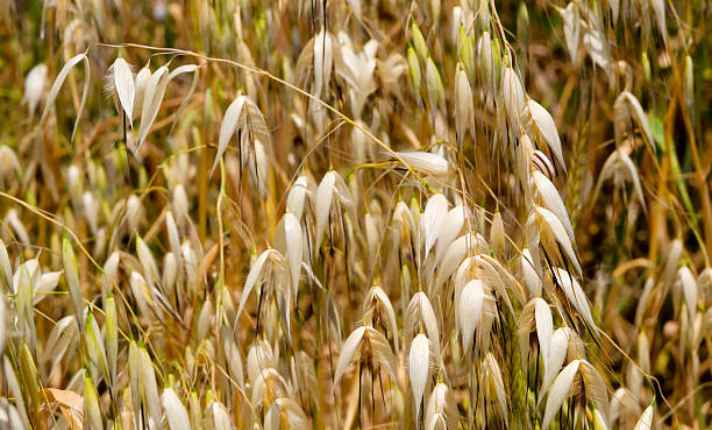
Bad Companion Plants for Raspberries
Choosing plants that are beneficial for them helps in better fruit production. On the other hand, some plants can transmit soil-borne diseases which can harm the raspberry bushes.
It’s important to avoid these unsuitable companions to ensure the growth and health of your raspberries.
1. Tomatoes
Growing tomatoes near raspberries can be tricky because tomatoes can carry verticillium root rot and other diseases like blight and verticillium wilt.
These diseases can harm raspberry plants It’s important to avoid planting tomatoes close to raspberries if you want to keep your soil and plants healthy.
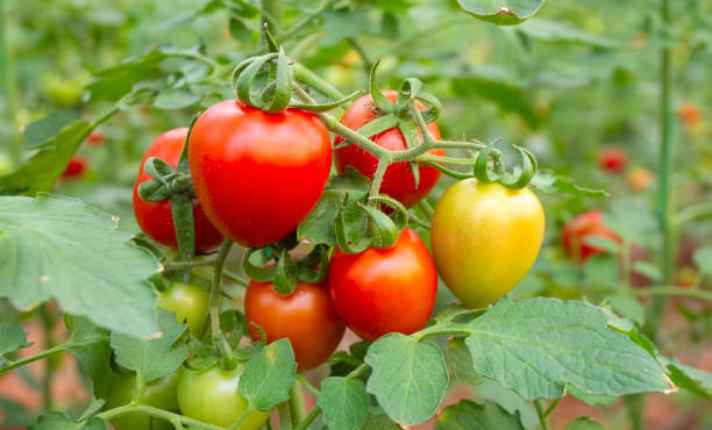
2. Potatoes
When planting raspberries, it’s important to avoid planting potatoes nearby. Potatoes are part of the nightshade family and can spread the verticillium virus to your raspberries.
This virus can cause verticillium wilt, a serious disease that weakens the plants.
Additionally, growing potatoes near raspberries can lead to fungal infections and blight, harming your garden. Keep these plants separate to ensure healthy growth for your raspberries.
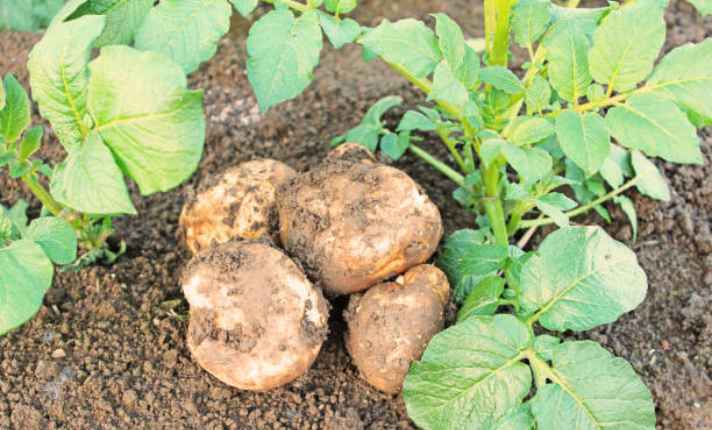
3. Blueberries
Blueberries need very acidic soil to thrive, while raspberries prefer mildly acidic soil. If you plant both fruits together, only one will thrive. To grow both successfully, try using separate beds or containers to match their soil needs.
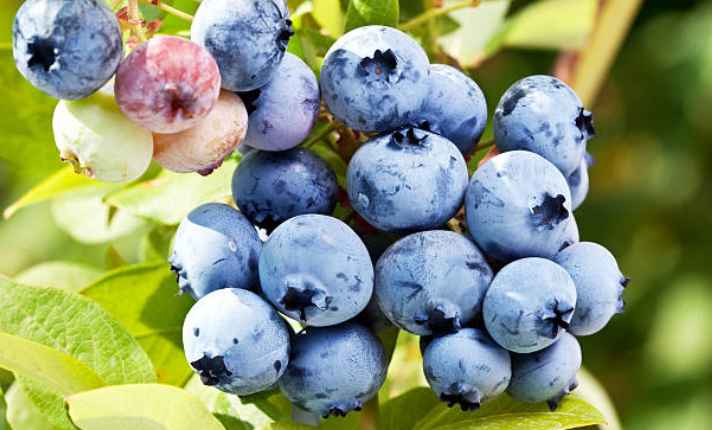
4. Peppers
Avoid planting peppers near raspberry plants because they can cause fungal infections. These infections make raspberries weak and susceptible to death from verticillium wilt.
Always check if peppers were grown in the area in the past four years.
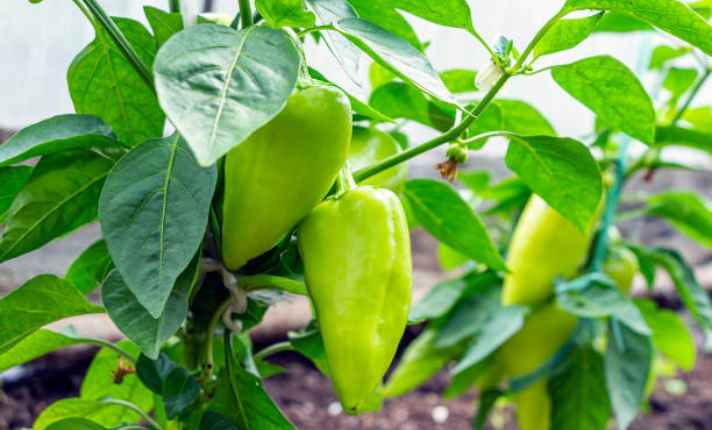
5. Strawberries
When growing raspberries, you should avoid planting strawberries nearby. This is because strawberries are susceptible to the same root-rotting diseases as raspberries.
If the land has been planted with strawberries for four years or more, it can build up a population of these diseases.
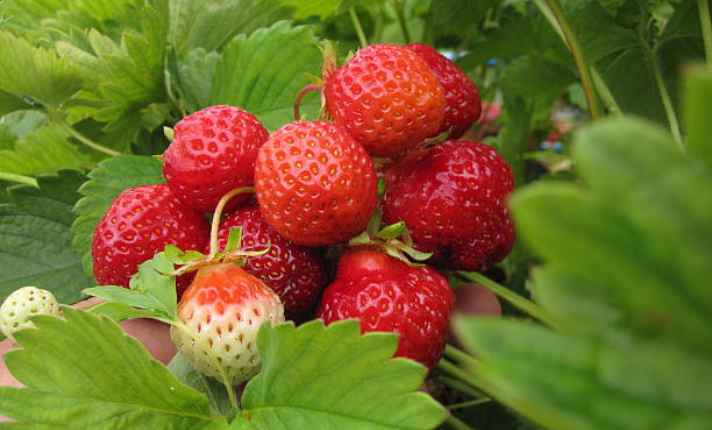
FAQ’s
Q: Can Cucumbers and Raspberries Be Planted Together?
A: Yes, you can! Cucumbers and raspberries belong to different plant families, so they avoid the same pests and diseases. Just avoid planting raspberries with the nightshade family, like peppers, tomatoes, and eggplants.
Q: What Is the Best Area to Plant Raspberries?
A: Raspberries grow best in full sun, needing 6-8 hours of light daily, in rich, well-drained soil. They thrive in zone 3 to zone 10, depending on the variety.
Q: What Do Raspberries Like for Fertilizer?
A: Raspberries have basic fertilizing needs. It’s important to keep the plant healthy with a heavy dose of nitrogen. A balanced type of fertilizer is often preferred.
The ideal fertilizer for raspberry plants is a balanced 10-10-10 mix, or alternatively, pure nitrogen, applied at a rate of 4 to 5 pounds (1.8 to 2.3 kg) per 100 feet (30.4 m) of row.
Q: What Are the Top Tips for Growing Raspberries?
A: The top tips for growing raspberries are:
- Keep them well-watered, especially during dry spells.
- Ensure they receive plenty of moisture to support lush foliage and fruit growth.
- Use a drip irrigation system or leaky hose to water at ground level, which is ideal for maintaining consistent moisture.
- Focus on watering during flowering and fruiting stages to promote healthy fruit development.
Q: How Do I Make My Soil More Acidic for Raspberries?
A: To optimize soil pH for raspberries, maintain a range of 5.5 to 6.5, ideal for their growth. Use lime to raise pH if it’s low and sulfur to lower it if it’s high. Mix these materials into the top 4 to 6 inches of soil at the recommended rate.
Conclusion
Gardening has been a wonderful journey for me, full of learning and experimenting. I’ve found that raspberries grow healthily when planted with the right companion plants.
Flowers that attract pollinators can increase pollination and help your raspberries produce more berries. Keep flowers like nightshade away to deter pests. It’s fulfilling to see beautiful, productive berries thrive.
